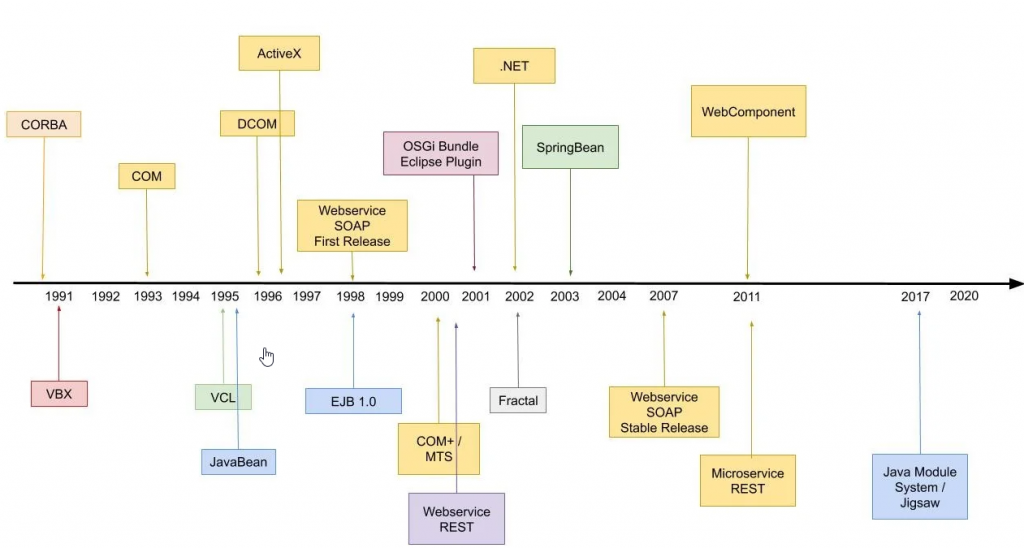
Während ältere Komponentenmodelle wie CORBA, DCOM und JavaBeans mittlerweile an Bedeutung verlieren, erleben Microservice-Architekturen gerade einen Höhenflug
Dylan Beattie – programmer, musician, and creator of the Rockstar programming language – for an entertaining look at the art of code. We’ll look at the origins of programming as an art form, from Conway’s Game of Life to the 1970s demoscene and the earliest Obfuscated C competitions. We’ll learn about esoteric languages and quines – how DO you create a program that prints its own source code? We’ll discover quine relays, code golf and generative art, and we’ll explore the phenomenon of live coding as performance – from the pioneers of electronic music to modern algoraves and live coding platforms like Sonic Pi
Details from here https://semver.org/
This white paper introduces Google BigQuery, a fully-managed and cloudbased interactive query service for massive datasets. BigQuery is the external
https://cloud.google.com/files/BigQueryTechnicalWP.pdf
implementation of one of the company’s core technologies whose code name
is Dremel. This paper discusses the uniqueness of the technology as a cloudenabled massively parallel query engine, the differences between BigQuery
and Dremel, and how BigQuery compares with other technologies such as
MapReduce/Hadoop and existing data warehouse solutions.
Implementation of an MPP SQL query engine for the Hadoop environment•Designed for performance: brand-new engine, written in C++•Maintains Hadoop flexibility by utilizing standard Hadoop components (HDFS, Hbase, Metastore, Yarn)•Reads widely used Hadoop file formats (e.g. Parquet, Avro, RC, …)•Runs on same nodes that run Hadoop processes•Plays well with traditional BI tools:exposes/interacts with industry-standard interfaces (odbc/jdbc, Kerberos and LDAP, ANSI SQL)
http://cidrdb.org/cidr2015/Slides/28_CIDR15_Slides_Paper28.pdf
Delta Lake is an open-source storage layer that brings ACID
https://delta.io/
transactions to Apache Spark™ and big data workloads.
All data in Delta Lake is stored in Apache Parquet format enabling Delta Lake to leverage the efficient compression and encoding schemes that are native to Parquet.
Presto is an open source distributed SQL query engine for running interactive analytic queries against data sources of all sizes ranging from gigabytes to petabytes.
Presto was designed and written from the ground up for interactive analytics and approaches the speed of commercial data warehouses while scaling to the size of organizations like Facebook.
https://prestodb.io/
In this paper, we describe the Polaris distributed SQL query engine
https://www.vldb.org/pvldb/vol13/p3204-saborit.pdf
in Azure Synapse. It is the result of a multi-year project to rearchitect the query processing framework in the SQL DW parallel
data warehouse service, and addresses two main goals: (i) converge
data warehousing and big data workloads, and (ii) separate compute
and state for cloud-native execution.
Das Java Modulsystem bzw. die Idee dahinter hat eine lange Geschichte. Schaut man sich den JSR277 an, ist zu erkennen das dieser bereits Mitte 2005 formuliert und eingereicht wurde. Die Geburtswehen dauerten unglaubliche 12 Jahre!
Das muss den Entscheidern doch aufgefallen sein?! Das ist ein Zeichen! Sowas hat in einem Softwareprojekt etwas zu bedeuten.
Wenn Du merkst, dass Du ein totes Pferd reitest, steig ab!
… möchte man zurufen! Aber der Zug hat nun seit einigen Monaten Fahrt aufgenommen. Und alle, wirklich alle müssen sich nun mit dieser Lösung auseinandersetzen. Der tote Klepper wird geritten! Es wurden Strategien entwickelt:
Ganz egal das viele Projekte vorzüglichen Code hervorbrachten, bei Bedarf! existierende Modulsystem wie OSGi- oder auch das weniger bekannte Netbeans Module System (Netbeans Platform) verwendeten, nein mit dieser Lösung soll nicht nur die monolithisch gewachsene Java-Plattform aufgeräumt werden, sondern man wollte das Problem die Lösung auch zu einem Problem einer Lösung aller machen.
Übrigens finde ich den Projektnamen Jigsaw ganz passend, erinnert er doch an ein Massaker :-(
Hier noch ein paar Infos zum thema: https://www.heise.de/developer/artikel/Modulare-Java-Zukunft-Das-Java-Platform-Module-System-erklaert-3700766.html
… dieses Zitat wird Linus Torvalds zugeschrieben. Hier sind ein paar weitere: https://www.goodreads.com/author/quotes/92867.Linus_Torvalds oder hier
Auch das soll er gesagt haben: „Microsoft isn’t evil, they just make really crappy operating systems.“ Schade das es scheinbar nie eine Diskussion darüber zwischen Linus und Dave (Cutler) gegeben hat, das hätte interessant werden können :-)